Resources
This carefully curated collection of resources will help you find packages and learning resources to help you on your R journey.

Read files on the web into R
June Choe's tutorial provides valuable insights for R users desiring to read files directly from the web into their R environment. It caters to individuals seeking to streamline their workflow by skipping the download process. The focus is on various data sources like GitHub public repos, gists, private repos, and OSF. Techniques include utilizing the 'raw.githubusercontent.com' URLs for reading CSV files and handling binary files which can't be displayed as plain text. The content covers sessionInfo(), streaming with {duckdb}, and miscellaneous tips for efficient data import in R.
Go to Resource
Read hundreds of Excel files into one dataset with one line of code #shorts #excel #rstats - YouTube
Learn how to read multiple Excel files into one dataset using R with just one line of code.
Go to Resource
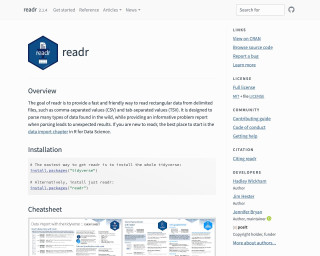
readr
The readr package provides a fast and friendly way to read rectangular data from delimited files, such as CSV and TSV. It supports various file formats and allows you to specify column types or guess them. This overview provides information on installation, usage, and column type guessing in readr.
Go to Resource
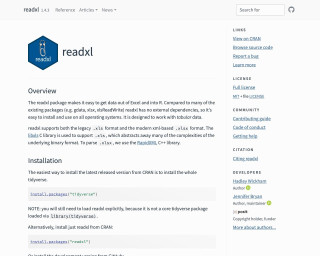
readxl
The readxl package makes it easy to get data out of Excel and into R. It supports both the legacy .xls format and the modern xml-based .xlsx format, and can read data from specific worksheets or cell ranges.
Go to Resource
Rebecca Barter - Learn to purrr
Learn about the purrr package in R, which provides map functions for iteration and manipulating lists.
Go to Resource
Recreate a real-world, complex dataviz with R & ggplot - YouTube
Recreate a real-world, complex dataviz with R & ggplot - YouTube
Go to Resource
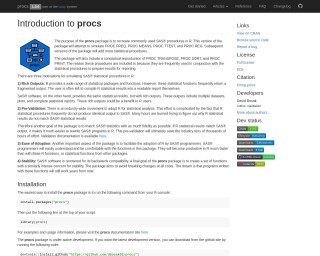
Recreate Some SAS® Procedures in R Using {procs}
The R package 'procs' replicates commonly used SAS procedures, targeting functions like PROC FREQ, PROC MEANS, PROC TTEST, and PROC REG. It simplifies the transition for SAS users to R by providing familiar functionality and outputs. This includes rich reporting outputs similar to SAS, pre-validated results to ensure fidelity with SAS outputs, ease of adoption for existing SAS users, and stability to maintain backward compatibility. The package includes data manipulation functions and aims to help save time in statistical results comparison and reporting.
Go to Resource
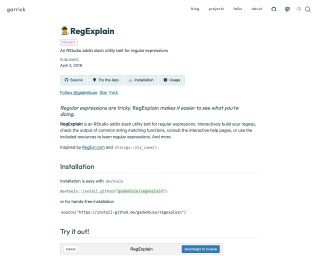
RegExplain
🕵️♂️ RegExplain is an RStudio addin and utility belt for regular expressions. It allows users to interactively build and test regular expressions, check the output of string matching functions, and consult help pages and resources.
Go to Resource

Render media to different formats • renderthis
The package 'renderthis' (formerly 'xaringanBuilder') enables users to render R Markdown and Quarto documents into various formats like HTML, PDF, PNG, GIF, PPTX, and MP4. It specifically caters to xaringan or revealjs slide presentations and includes a 'social' output optimized for sharing on social media. Installation requires dependencies and a local Google Chrome browser. It simplifies rendering with functions prefixed by to_*() requiring a source file path. Additional dependencies are needed for certain formats, with instructions provided for each case. The package supports an efficient workflow for preparing presentations for diverse sharing and publication purposes.
Go to Resource
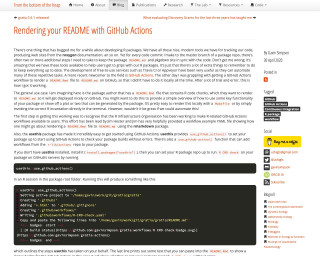
Rendering your README with GitHub Actions
This tutorial explains how to use GitHub Actions to automatically render your README.Rmd file to README.md on GitHub.
Go to Resource
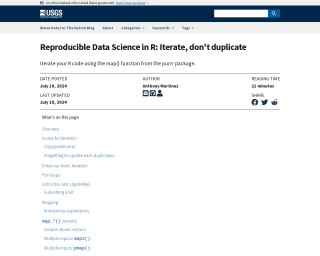
Reproducible Data Science in R: Iterate, don't duplicate
This blog post on the Water Data For The Nation Blog guides novice to intermediate R users on how to achieve reproducible data science by replacing code duplication with iteration techniques. It introduces the 'map()' function from the purrr package, explaining its advantages over copy/paste approaches and for loops. The post covers mapping techniques, the usage of lists, various map_*() function variants, and working with multiple inputs or no outputs. It is part of a series aimed at building functional programming skills and creating efficient data workflows with the targets R package.
Go to Resource
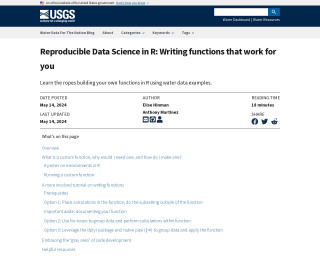
Reproducible Data Science in R: Writing functions that work for you
This blog post from the Water Data For The Nation Blog guides readers on crafting custom functions in R for reproducible data science, particularly with water-related data. Starting from the basics, it emphasizes the benefits like consistency, error reduction, and code shortening by avoiding repeated tasks. The post covers function essentials and environments in R, providing a step-by-step tutorial using the Water Quality Portal data. It prepares readers for advanced function usage in R, targeting those with basic programming experience aiming to advance their skills.
Go to Resource